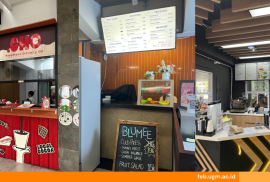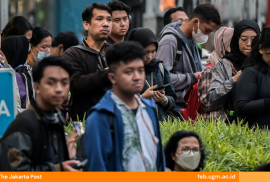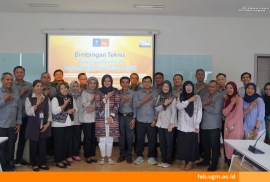The Faculty of Economics and Business UGM students have gained international recognition again by winning the GBSN Social Logistics Challenge 2024, held online by the Global Business School Network from 6 October to 5 November 2024.
The Bulaksumur Consulting team triumphed over 103 other formidable teams from 21 countries worldwide. The team members – Najwa Waqi’ah (Management 2022), Gustav Susanto (Management 2022), Nikita Dinda Azizah (Management 2022), Risang Mar’atun Sholihah (Management 2022), and Magnesia Putri Azalia (Industrial Engineering 2022) – celebrated becoming the first Indonesian team to win this competition.
“We are proud and excited to be the first team from Indonesia to win this competition,” said Najwa on Friday (15 November).
Najwa explained that they had to tackle a case study in the competition, namely the Social Logistics Challenge. This case highlighted significant inequalities in the distribution of healthcare resources to remote areas. Many communities in rural or remote regions face substantial challenges in accessing essential medical needs, including medicines, medical equipment, and primary health care services.
Introducing a Community-Based Supply Chain System
Such conditions, Najwa continued, exacerbate health inequalities between urban and rural areas and hinder progress towards good health and well-being. Logistical barriers in these regions are often due to inadequate transport infrastructure and the need for real-time data on local healthcare needs, leading to inefficient and usually delayed resource distribution.
“We proposed a digitally integrated community-based supply chain system to address this issue,” she explained.
Najwa explained that the supply chain system was developed using mobile technology and data analytics. This system can more accurately assess and predict medical needs in each region. With continuously updated data on health needs and collaboration between local health workers, regional logistics partners, and technology providers, the system can ensure rapid and targeted distribution to impoverished areas. Local governments, healthcare organizations, and community members play a critical role in this process, providing essential insight into challenges and needs.
The concept proposed by the FEB UGM student team focuses on improving health outcomes, developing resilient and inclusive infrastructure, and promoting sustainable practices to reduce environmental impact. By bridging logistical gaps through technology and cross-sector collaboration, this solution not only improves access to healthcare in remote areas but also serves as a model for applying social logistics principles to address various social challenges at the community level.
Reportage: Orie Priscylla Mapeda Lumalan
Editor: Kurnia Ekaptiningrum
Related article: Winners in 2024 Social Logistics Challenge
Sustainable Development Goals








